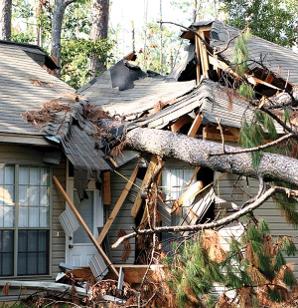 At one time or another, just about every homeowner or someone the homeowner knows has had a tree fall due to wind, a storm or winter weather. The question that everyone wants to know is, “Will my homeowners insurance pay for the damage?” At one time or another, just about every homeowner or someone the homeowner knows has had a tree fall due to wind, a storm or winter weather. The question that everyone wants to know is, “Will my homeowners insurance pay for the damage?”
The answer is that it depends on the terms of your policy. Each homeowner should look at their homeowners policy or talk with a representative from their insurance company to find out what the policy specifically covers and doesn’t cover. Homeowners should also be sure to know what the policy deductible is, and any dollar limits on the amount of damage the policy will cover. Although the terms of your actual policy will determine if the damage you have incurred is covered, generally many homeowners policies will:
- provide coverage for damage to your home and the contents of your home if a tree (even if it is your neighbor’s tree) falls on your home or other insured structure, such as a fence or a detached garage. If your neighbor's tree was dead and the neighbor knew it was dead, then your homeowners insurance company may seek reimbursement from your neighbor for the claim. This is called, “subrogation.”
Remember, though, that the amount of coverage will be determined by your policy’s dollar limits. Your homeowners policy may also pay a limited amount (usually between $500 and $1,000) to remove the tree from your property. The amount paid for tree removal is typically based on the event and not the number of trees that fall. This means that you will receive the same amount of money whether one tree falls or if 10 trees fall.
- provide some coverage for the cost of tree removal. Many policies pay a limited amount (usually between $500 and $1,000) to remove the tree(s) from your property, whether the tree damages an insured structure or just falls in your yard. The amount paid for tree removal is typically based on the event and not the number of trees that fall. This means that you will receive the same amount of money whether just one tree falls, or if 10 trees fall.
- provide some coverage for damage to your trees, shrubs or plants in certain very limited circumstances, such as fire, lightning or vandalism; damage from snow, ice or wind is generally not covered. Generally, the amount that your homeowners policy will pay is limited to 5% of the coverage of the structure (this is called your Coverage A), and is capped at $500 for any one item.
- not provide coverage for damage to your car if the tree falls on it. If you have comprehensive coverage on your automobile though, then your automobile policy may pay for the damage.
Additionally, your local municipality may arrange for debris removal after a major storm that affects a large area. Watch for information in the newspaper or listen to the radio for details. If there is debris removal by a government jurisdiction, you may need to sign a Right of Entry form granting permission to come onto your property and remove the debris. Before the debris is removed, you should photograph all damaged property because your policy will likely require you to prove your loss.
You should review your insurance policy annually to make sure that you have the appropriate coverage. For more information regarding your homeowners insurance policy, read our information about homeowners and renters insurance. |
